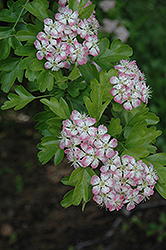Height: 20 feet
Spread: 20 feet
Sunlight:
![]()
![]()
Hardiness Zone: 5a
Description:
One of the most popular small accent trees for home landscapes; blanketed in showy double red flowers in spring and scarlet fruit in fall; can be susceptible to leaf diseases and quite thorny, best used as a feature tree in the small home landscape
Ornamental Features
Paul's Scarlet English Hawthorn features showy clusters of red flowers held atop the branches in mid spring. It has forest green deciduous foliage. The glossy lobed leaves do not develop any appreciable fall colour. The fruits are showy red pomes displayed from early fall to late winter.
Landscape Attributes
Paul's Scarlet English Hawthorn is a deciduous tree with a more or less rounded form. Its average texture blends into the landscape, but can be balanced by one or two finer or coarser trees or shrubs for an effective composition.
This is a relatively low maintenance tree, and is best pruned in late winter once the threat of extreme cold has passed. Gardeners should be aware of the following characteristic(s) that may warrant special consideration;
- Disease
- Spiny
Paul's Scarlet English Hawthorn is recommended for the following landscape applications;
- Accent
- Hedges/Screening
Planting & Growing
Paul's Scarlet English Hawthorn will grow to be about 20 feet tall at maturity, with a spread of 20 feet. It has a low canopy with a typical clearance of 4 feet from the ground, and is suitable for planting under power lines. It grows at a medium rate, and under ideal conditions can be expected to live for 40 years or more.
This tree does best in full sun to partial shade. It is very adaptable to both dry and moist growing conditions, but will not tolerate any standing water. It is not particular as to soil type or pH. It is somewhat tolerant of urban pollution. This is a selected variety of a species not originally from North America.
Disclaimer - This resource is provided for informational purposes only and does NOT reflect current availability. Inventory varies seasonally, so we cannot guarantee that every plant will be in stock at all times - please contact your favourite GardenWorks location directly for current availability. It does not include our entire inventory of plants, so be sure to visit GardenWorks to see varieties that may not be represented on this list.

